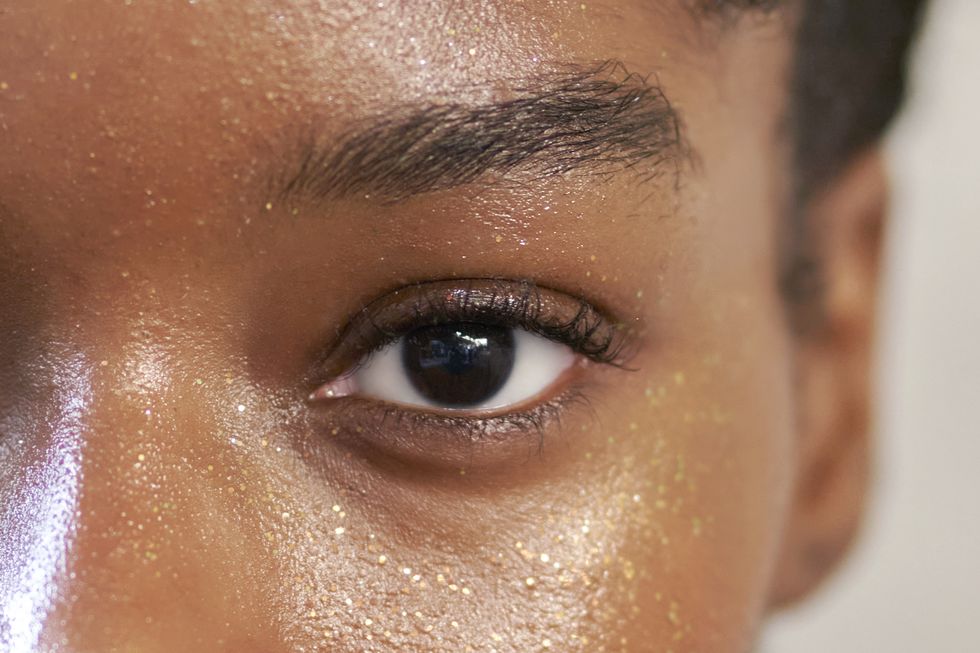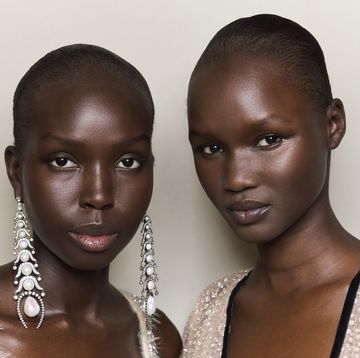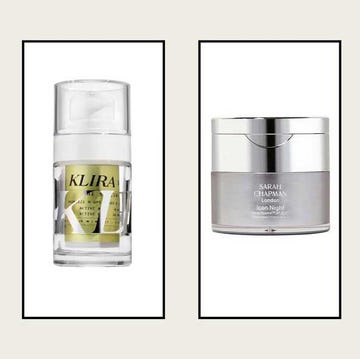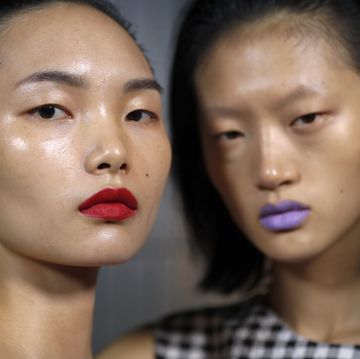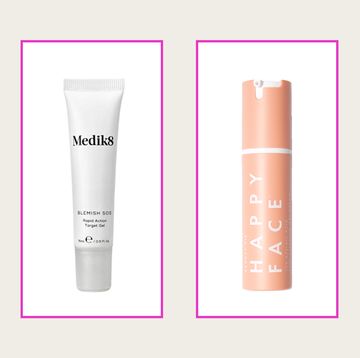We’re all familiar with the line from Roald Dahl’s The Twits: 'If you have good thoughts they will shine out of your face like sunbeams and you will always look lovely.' Saccharine yes, but not exactly the most scientific approach for someone battling acne, rosacea or decades of SPF denial. Yet for a growing number of young women, those good thoughts are the missing cog in the wheel of healthy skin. Where once the answer lay in a dizzying menagerie of potions for minimising lines and spots, now manifesting is seen as a key step in a skincare routine. The goal, say stans, is simple: visualise how it feels to have good skin and then realise that dream through positive affirmations, journaling and a small side of gratitude.
How can manifesting help your skin?
Manifesting is the latest wellness buzzword on social media (‘manifestation’ has been tagged more than 13 billion times on TikTok) and now it’s entering the beauty space. Essentially, manifesting is using the power of our minds to bring measurable change to our lives. At the crux of the practice is the ‘Law of Attraction’, which states that your thoughts and feelings have a certain frequency. In other words, positive or negative thoughts attract positive or negative situations.
Of course, it's a bit more complex than that when it comes to skin. 'A manifesting practice can support you in changing the way you think and feel about your skin,' says Giselle La Pompe-Moore, spiritual guide and author of Take It In: Do the inner work. Create your best damn life. La Pompe-Moore not only spent some years working in the beauty industry but includes manifesting in her personal skincare routine. 'When we avoid big opportunities because of say an acne breakout, we often believe the solution lies in our skin getting "better". But, the richer work is in finding comfort and giving ourselves permission to be in the world regardless of how we look.'
On a practical level, 'the importance of healthy habits, daily routine and self-love help to empower your manifesting journey,' adds self-development coach and author of Manifest, Roxie Nafousi. 'Taking better care of yourself day-to-day will have benefits for your skin.'
But can manifesting change your physical appearance?
TikTok is awash with influencers claiming to manifest ‘glow ups' and inflated lips purely using manifestation techniques – an idea Nafousi dismisses as 'nonsense'. Yet, a growing number of dermatologists believe that while manifesting can’t change your physical appearance, it may reduce your stress response – one that leaves skin looking creased, inflamed and spotty.
Known as the mind-body connection, it’s based on the idea that the brain and skin are formed from the same layer of cells and are therefore connected. 'The brain is what processes feelings and the body is the physical manifestation of them,” says Dr Alia Ahmed, a psychodermatologist at the London Skin and Hair Clinic who has spent years exploring the link between our mental health and complexions.
When we experience emotional duress, the hormone cortisol is released via a stress-activated pathway between the brain and adrenal glands (the HPA axis). At the same time, cortisol triggers inflammation in skin. 'Studies suggest that cortisol delays healing, disrupts the skin’s natural barrier and ramps up the activity of sebaceous glands, leading to blemishes,' says Dr Ahmed. Conversely, cortisol can also cause patches of dry skin to bloom across the body. If you ask dermatologist Dr Howard Murad, stressed skin is ‘leaky’. 'Cortisol weakens the skin barrier and causes water to leak out of cells,' he says. 'Without cortisol, your skin has a better chance of staying hydrated and looking brighter.'
In a cruel catch-22, the worse our skin looks, the more stressed we feel. So is it plausible that if cortisol worsens skin conditions, the reverse could also be true and positive thinking could improve skin? Dr Ahmed words it differently to La Pompe-Moore and Nafousi, but confirms that it’s possible. 'Taking ten minutes out of your day to practice a positive technique such as manifesting can boost mood, improve coping skills and reduce stress – all of which may affect the HPA axis and the impact of cortisol on skin,' she notes, although to date there is no clear medical evidence to support this.
'Practising positive affirmations during your skincare routine is something I advocate as it means people treat their skin with more care, which ultimately leads to an improvement in symptoms,' she adds.
Dr Murad is also a fan of positive affirmations. So much so, his inspirations app sends you a daily affirmation to repeat when applying products like his Resurgence Targeted Wrinkle Corrector. ‘Why have a bad day, when you can have a good day?’ is a favourite. What’s more, in a clinical study conducted on 40 patients, he found that after four weeks of reading positive statements twice a day and journaling thoughts, they scored lower blood pressure and stress levels and higher levels of skin hydration.
Better skin is a two-pronged approach
So is manifesting the answer to our skin woes? Consultant dermatologist Dr Anjali Mahto agrees that manifesting can help to reduce stress, which is a trigger for many inflammatory skin conditions. But we shouldn’t assume it’s a cure-all, she cautions. 'Manifesting can improve how people feel about their skin but it can’t improve an actual skin condition – that’s an important distinction to make,' Dr Mahto says. Likewise, she points out that manifesting could encourage self-blame: those who suffer with skin diseases aren’t trying hard enough to think themselves out of their acne or eczema.
Instead, Dr Mahto prefers to lean on proven skincare ingredients – niacinamide and salicylic acid for acne-prone skin, hyaluronic acid to replenish dry skin. La Roche-Posay Effaclar Purifying Cleansing Gel, Paula’s Choice Skin Perfecting 2% BHA Liquid Exfoliant and Vichy Mineral 89 Hyaluronic Acid Hydrating Serum are all favourites.
Perhaps the answer lies in a more holistic rather than an either/or approach, reasons La Pompe-Moore. 'We can fall into the trap of believing that skincare alone is a miracle worker – the same goes for a manifesting practice,' she says. 'You can physically work with a targeted skincare routine, mentally add in a skin meditation practice and emotionally use self-acceptance affirmations. Working on all of these areas will have the most impact on your relationship with your skin.'
And 'relationship with your skin' is key. If anything, we rarely give our skin enough credit for the incredible job it does at protecting us from toxic aggressors. Not to mention, most of us have a precarious relationship with our self-image. So surely anything we can do to be kinder to ourselves is a good thing. To quote Nafousi, manifesting is ultimately about self-worth.
If you’re struggling, this is how to use manifesting to help the skin you’re in
1.Track your skin story in a journal
'Include any worries, experiences with your skin, information about its physical condition and any narratives around beauty standards you've taken in,' says La Pompe-Moore. 'You might realise that your acne flares up after periods of intense stress or that you've been 'waiting for your skin to heal' before you start dating, travelling or any other goals.'
2. Remove labels
See your skin as normal. 'Remove labels that can be emotionally distressing – for example, instead of "My acne scars are ugly" try saying "I have scars from my acne, this was part of my skin journey. All skin is normal",' says Dr Ahmed.
3. Focus on gratitude
'Write down all the incredible traits you have that prove you're more than what you look like,' says La Pompe-Moore, who also recommends making a note of all the tangible things your skin does that you’re grateful for, such as regulating your body temperature.
4. Set an intention before starting your skincare routine
Focus on how you want to feel about your skin. 'Slow down your routine and listen to a guided meditation (try Wild Source https://wildsource.co.uk) while you apply your products,' says La Pompe-Moore. 'This will also give you a chance to spend time mindfully touching your skin rather than only doing so in order to "fix" or pick it.'
5. Repeat positive affirmations
La Pompe-Moore warns against using a photographic vision board of 'perfect' skin. 'It will only make you feel bad,' she says. 'Instead, visualise how you want to feel in your skin and write positive affirmations on post-its then stick them to your mirror.' Good ones to repeat include: ‘I feel at home in my skin’; 'I feel safe meeting new people and taking photos’; 'I accept what I see in the mirror as I am so much more than what I see'. One study found that affirmations increase brain activity in areas associated with reward and, by proxy, encourage positive emotions.

